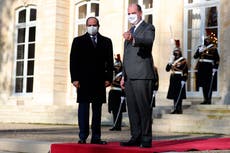It’s International Human Rights Day – genocide hasn’t gone away and we must use the law to uphold freedom
After hopeful events such as the end of apartheid, the fall of the Soviet Union and the Northern Ireland peace process, we now live in a time of international terrorism, war and a resurgence of authoritarianism

Today is International Human Rights Day, and never has it been clearer that human rights cannot be divorced from geopolitics and trade. At the start of the week, my colleagues and I in the House of Lords passed a cross-party amendment to block trade agreements with any country deemed by the UK high court to be committing genocide. This is going to have far reaching consequences for any regime that thinks trade with the UK will always go above human rights. It should come as a strong warning, particularly to the Chinese leadership for the atrocities being committed against the Uighur people.
The Institute of Human Rights of the International Bar Association was created 25 years ago and, as its director, I find it striking to consider whether the world has changed since then. It was a moment of great hope. Nelson Mandela had just been freed from prison, apartheid had ended, and he was leading a new South Africa. The Cold War was over, the Soviet Union dissolved, and there were new democracies burgeoning all over Eastern Europe and Central Asia. At the same time, the Juntas of Latin America were collapsing, and in Africa democracy and the rule of law were on the rise. The world was full of promise that every man and woman might just enjoy freedom and that human rights would be respected. The role of judges and lawyers, of course, was fundamental to that.
As the 20th century ended, a peace process brought the troubles in Northern Ireland to resolution. Universal jurisdiction had brought the case of Pinochet before the courts in Britain. There would be no impunity for dictators who had tortured and killed. As the millennium dawned, it seemed we were entering a whole new era where human rights would at last be on every agenda. The right to life, the human yearning for freedom and liberty would be a rallying cry. The freedom to live free from torture, freedom of association and trade unions in your communities, in your colleges. Freedom to protest, freedom of expression, freedom to oppose government, freedom of thought and belief and religion. Freedom to love and be loved by whoever you chose. The right to liberty only withdrawn after due process in a fair trial. The words on our lips were self-determination, agency and dignity.
But the new century brought events that diminished that hope. We now live in a time of international terrorism, war and a resurgence of authoritarianism that has been a creeping reality especially in the last few years. Enforced disappearances, rendition and torture have all increased. We have also been witness to the creation of statelessness, extrajudicial killings, assassinations by drones, poisoning and beheadings. The use of chemical weapons, abductions, mass rape and gender based violence has come back on a shocking scale, along with the manifest misogyny and abuse of women and girls. We have seen the violent crushing of peaceful protest, racist policing, and the mass incarceration of Black communities in particular.
The reason our bill was necessary at the start of this week is that genocide has not gone away and in the Uighur case, there has been a return of concentration camps. This has all been made worse by the attacks by populist authoritarian leaders on judges, lawyers, journalists, academics and public servants.
The need now is for us to reassert the centrality of law and a respect for human rights. It is vital. And we as lawyers are the guardians of law. We are the people who can make rights a reality. The Human Rights Institute trains lawyers and judges, intervenes in international court actions, conducts trial observations, leads task forces and creates toolkits to make our work fulfill its objectives. This is an anniversary to recognise the importance of our existence, made possible by all those lawyers around the world who contribute to the work that we do on human rights and at the institute.
On the same day that we passed our amendment, French President Emmanuel Macron welcomed Egyptian dictator Abdel Fattah Al-Sisi and made it clear that his government would not put human rights above the selling of arms to his regime. The UK must lead the way and show that another path is possible, and the abuse by foreign dictators of their people will not be tolerated. This has never been more important.
Baroness Helena Kennedy, director of The International Bar Association Institute for Human Rights
Join our commenting forum
Join thought-provoking conversations, follow other Independent readers and see their replies
Comments


Bookmark popover
Removed from bookmarks